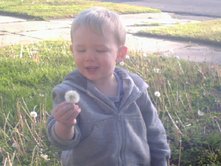
This is the sermon for Feb 1, 2009 at Trinity Church of the Nazarene.
This passage is a continuation from last week’s message.
This passage is a continuation from last week’s message.
Last week we talked about how Jesus called the disciples—called them to be fishers of people, to lay down their nets and become fishers of people. We talked about what it means to be a disciple.
This week we are talking about how Jesus takes these new followers to Capernaum to teach in the synagogue there.
And Jesus starts to teach. What he’s teaching, who knows? Maybe he’s teaching one of his parables. Maybe he’s teaching how to be a disciple. The scripture does not tell us what he’s teaching—just that he is.
When suddenly a man starts shouting out to Jesus; possessed by an evil spirit. He asks Jesus if he is the one who is to destroy evil and declares he is God’s Holy One.
Jesus commands the evil spirit out of the man and everyone walks away amazed at Jesus’ teaching as one with authority.
Now, I do not know about your experiences… but in my personal experience, this kind of stuff just does not seem to happen anymore.
When was the last time you were in church next to a person who was demon possessed?
Right? Seriously—have you seen anyone cast out a demon lately in the Church of the Nazarene?
Really, what does this have to do with us?
In our empirical age of science and reason-- does this passage have anything to do with us?
Does this passage have any relevance whatsoever?
This is just utter silliness is it not?
Or… perhaps it is not so ridiculous.
Or… perhaps it is not so ridiculous.
(This is when I will pull out my mailbox- pictured above- and say): Yeah, this kind of stuff still happens.
The forces of evil are still very much at work in people’s lives.
Someone, this last week… thought they were better than me. Thought they were more important than me. Thought what they wanted was more important than my need to get mail.
Someone, this last week… thought they were better than me. Thought they were more important than me. Thought what they wanted was more important than my need to get mail.
Someone this week—smashed my poor mailbox with a baseball bat; or so it appears.
Yes. Evil manifests itself physically still today.
This poor, beat up mailbox is a symbol of evil spirit’s possession in our culture.
No matter how intellegent we are, no matter how scientific data oriented we are-- there is one thing we cannot deny-- Jesus confronted evil and evil is still very much at work today.
We are possessed by a lot of things. We are possessed by greed. We are possessed by violence. We are possessed by money, pride, drugs, sex, and so much more (See Girardian Lectionary 4th Sunday after the Epiphany Year B, under Michael Hardin and Jeff Krantz).
We are possessed by our own power of selfishness.
We are possessed by the desire to exert what we want at the expense of mailboxes.
Yes. This passage has a lot to do with us; does it not?
Yes. This passage has a lot to do with us; does it not?
We live in a culture possessed by evil; possessed more by an evil spirit than by the Holy Spirit.
And so we have every reason in the world to look at this passage a little more closely—to see what Jesus has to say about evil.
And so we have every reason in the world to look at this passage a little more closely—to see what Jesus has to say about evil.
One of the first things that struck me (and several of my friends whom I was chatting about this passage with this week) was how it happened IN the synagogue.
That is quite bizarre, is it not?
Should Jesus not be confronting evil spirits OUTSIDE the church building? I mean, really—IN the synagogue?
There was evil... an evil spirit, IN the Synagogue? Who does that?
It makes you wonder: Was this guy scary for the people in the synagogue that day?
Did he walk in and everyone stopped breathing—like in a television “hold up” scene? Did people throw themselves on the floor in fear, arms in the air?
Did the guy walk in the building suddenly and send raging fear into everyone?
Or… was it the exact opposite? Perhaps the man was “church member J” who sat in the synagogue every single week and no one was afraid to see him because he belonged in the synagogue. This was his space.
The passage does not say anyone went away talking about the man. They went away taking about the teacher—the teacher with authority.
And so we are left wondering… what if the people listening to the teaching of Jesus that day were people who were in the synagogue every single day? What if the people in the synagogue that day never noticed that “church member J” was possessed by evil—until Jesus reveals it—until Jesus uncovers the man’s selfishness; the man’s evil possession?
Wow. Let that one sink in for a bit.
Wow. Let that one sink in for a bit.
See the great truth about Jesus—is even people IN the synagogue can be set free from evil.
Even people in the Church can be set free from evil.
Even people who refuse to admit they are anything but holy—are confronted with their selfishness when Jesus comes around.
As Kaza Fraley says, "Jesus gives him a new lease on life, a second chance, the ability to start fresh and make better choices, the ability to choose to love God and neighbor as the scriptures require."
Jesus gives this man who is IN the synagague another opportunity to truly love--to truly be holy. To find himself where he belonged in God's plan for his life.
And this can either sting (that Jesus can confront any of us and show us where He needs to work)… or be the most comforting thing in the whole world.
Because people are always brought together for one of two reasons… either around a common sense of self-righteousness (that they are so holy and so pure)—or people can be brought together based on a common sense of brokenness (“Becoming the Answer to Our Prayers,” Shane Claiborne and Jonathan Wilson-Hartgrove, IVP, 2008,page 47).
Instead of being brought together by a common sense of being more holy than the next person… that we have it all figured out and no one is as good as us…
Perhaps we should be brought together by the understand we are all just as horrible as the person next to us. We are all just as sinful and selfish as the person next to us. We are all vulnerable and broken, laid bare for who we really are before Jesus who confronts the evil within us.
As Thomas A Kempis says in "The Imitation of Christ," A person "who truly knows" themselves "realizes" their "own worthlessness" (Penquin Classics, page 28).
If it stings to confront your own worthlessness and selfishness, perhaps one is clinging to their self-righteous status a little too closely.
If it is the most comforting thing in the world, perhaps one is okay with being broken before the brothers and sisters around them—willing to admit they do not have it all together. Willing to admit they are not completely perfect; completely selfless.
“We are better off beating our chests and praying that God would be merciful enough to save us from this present ugliness and make our lives so beautiful that people cannot resist the mercy” (“Becoming the Answer to our Prayers”, page 48).
This is an excellent set up for Lent-- which begins Feb 25 this year, with Ash Wednesday.
Lent is the time of year, 40 days before Easter, that set apart time in the Church calendar to focus on the life of Christ. 40 whole days that center on Christ's life and ministry.
For these 40 days of Lent to mean anything or teach us anything—we must be willing to confess we do not have it all together-- that we are not worthy; that we are not quite eternally perfect in all ways.
For Lent to change our very being, we must be ready to let Jesus confront the evil within us.
The season of Lent, the 40 days that go from Ash Wednesday to Easter Sunday morning create a space for us to be set free from evil (just like Jesus set this man free from evil).
The season of Lent, the 40 days that go from Ash Wednesday to Easter Sunday morning create an opportunity for us to learn about our dependence on things—on objects-- on items (just like Jesus set this man free from his dependence that day).
The season of Lent, the 40 days that go from Ash Wednesday to Easter Sunday morning create a place for God to show us, the good Church people who show up to the synagogue all the time, where Jesus might show us our own desires, our own selfishness, our own desire to be unclean (just like this man apparently was at the synagogue where people allowed his selfishness and evil spirit to run).
The season of Lent- calls us out of a feeble understanding of holiness and into a bright and beautiful (although difficult) transformational way of becomming the holy people of God together.
The season of Lent-- challenges us, even now (in Epiphany), to look up at Jesus.
This message-- of standing before the Light is really a call to genuine holiness.
Often when things “get a little difficult, we tend to become consumed with trying to make our lives comfortable again. But by doing so we miss a great spiritual opportunity.” Which means we must ask ourselves: “Would I rather live a life of ease and comfort and remain immature in Christ, or am I willing to be seasoned with suffering if by doing so I am conformed to the image of Christ” (“Sacred Marriage” by Gary Thomas, Zondervan, 2000, page 131).
We must allow Jesus to walk in the synagogue of our hearts—walk into our synagogue and make us a little uncomfortable. Walk into the synagogue to teach and reveal the evil spirits that rage within us—so that we might be made more beautiful, more holy, more amazing-- in genuine holiness.
For in our common brokenness… we are united—and in our common beauty, we are also united.
We are just as horrible and broken as the next person and we are just as beautiful as the next person.
We are tempted to trust in our own holiness (especially in our special and sacred tradition).
We are tempted to trust in our own holiness (especially in our special and sacred tradition).
We are tempted to trust that we are more beautiful than the next person.
We are tempted to ignore the power of evil selfishness that rages throughout us—unwilling to confront it and see the blood on our own hands; to see the darkness of our own selfishness.
“God is not glorified when we try to live together as perfect people” (“Becoming the Answer to Our Prayers, page 69).
“God is not glorified when we try to live together as perfect people” (“Becoming the Answer to Our Prayers, page 69).
God is glorified in our humbling of ourselves-- humbling ourselves with a “childlike willingness to acknowledge all our faults” (Sacred Marriage, Gary Thomas, 96).
God is glorified when we beat our chests, together, and cry out for mercy. When we give up ourselves enough to admit we could be a little selfish. Where we let God transform all of who we really are.
Because the truth is—not even I, your pastor, have it all together. Not even people with multiple degrees and ordination has it all together.
I’m just as terrible as the next person. I’m just as beautiful as the next person.
We do not have to have it all together—we do not have to know everything. We do not have to claim to our holiness so tightly we refuse to admit there are places evil manifests itself physically today…
And so I must allow Jesus to stand before me and cast out the evil selfishness within me. To continue to transform me and make me less of Christy and more like Christ.
We do not have to have it all together—we do not have to know everything. We do not have to claim to our holiness so tightly we refuse to admit there are places evil manifests itself physically today…
And so I must allow Jesus to stand before me and cast out the evil selfishness within me. To continue to transform me and make me less of Christy and more like Christ.
For Jesus to stand before me in the synagogue of my heart and command the evil spirits of selfishness, pride, anger, and whatever else to come out of me—in the same way he did for this man in the Gospel of Mark.
And it is my prayer—that you will join me on this journey. To allow Jesus to stand at the synagogue of your heart and cast out the evil spirits of pride, anger, and selfishness out of you too.
And it is my prayer—that you will join me on this journey. To allow Jesus to stand at the synagogue of your heart and cast out the evil spirits of pride, anger, and selfishness out of you too.
*******************************
Added for Sunday morning:
I’m challenging you to look in your heart—let Jesus confront the unpleasing pieces of your life to God. Give God permission to walk around in the synagogue of your heart. I’m asking you to listen if God begins to say, “that’s a bad attitude, or the way you spoke to that person wasn’t good,” that we then choose to listen.
I don’t care if you’re church board member or “church member J”—or penitent slave… but WHAT WOULD HAPPEN if we came to church with anticipation that God would confront who we really are—and show us who we could be?
What would happen if everyone took action on what God was saying to us—if we came to the altar and declared, “I’m here to be who God wants me to be. I’m giving God permission to speak to my heart.”
Is your relationship with God so close you can tell me what the last thing was that God confronted you about?
Is your relationship with the Light of Christ so intense—you could confess what the last thing God worked on your heart about?
If not, perhaps God is inviting you to make your way to the altar. Let God work on your heart. Give God pretermission to show you who you could be.
I’m asking you to open yourself up and allow Jesus to confront the evil spirit within us and show us who we really are; to allow Jesus to point out to us where we might be more selfish than holy.
Just as with the man in the Synagogue that day—Jesus stands before us and shows the evil within us. The places Jesus still needs to work on—the places we still need God’s gracious work in our hearts and lives. The places we still need to be taken over by the Holy Spirit; for God to work in who we are and who we are becoming to continue.
Allow Jesus to work on you. Be willing to let God come into the synagogue of your heart and make you into a beautiful person.
**************************
Let’s pray (leaning on Stanley Hauerwas' "Prayers Plainly Spoken"):
Dear Heavenly Father,
We trust you. We trust in you to reveal to us who we really are—to show us who we really are when we cannot even fake it to ourselves.
All too often we want to “strut our stuff”—we like to parade our purity and beauty for the world to see… but inside we know we are hoping to become what we pretend.
Save us from this desire to fake.
Save us from this desire to be unclean.
Save us from the evil selfishness that rages deep within us—even when we refuse to admit it.
We want to be pure. We want to be holy. We want to be possessed by your Spirit.
We want to be pure. We want to be holy. We want to be possessed by your Spirit.
So come to the synagogues of our hearts and reveal to us who we really are. Reveal to us the selfishness. Reveal to us the stubbornness. Reveal to us our own self-righteousness…. So that we might become the beautiful one we desire to be.
Make us into more than we could ever fake.
We love you Lord, Amen.







